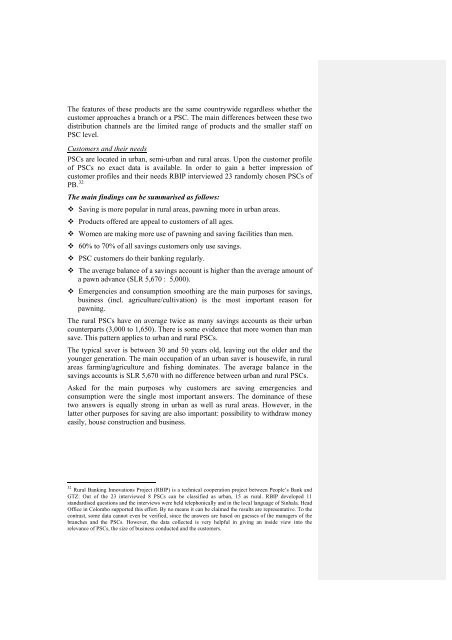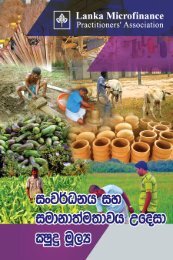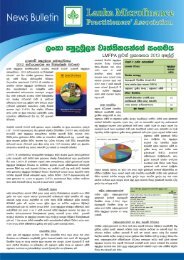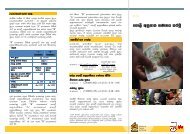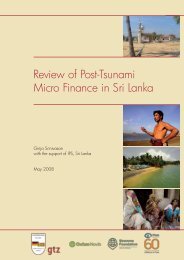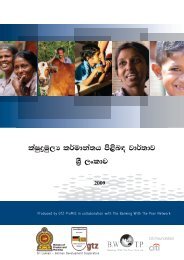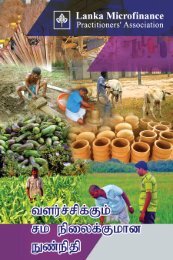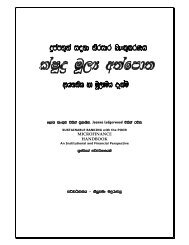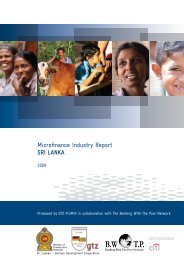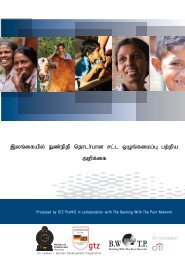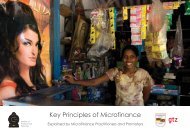National Microfinance Study of Sri Lanka: Survey of Practices and ...
National Microfinance Study of Sri Lanka: Survey of Practices and ...
National Microfinance Study of Sri Lanka: Survey of Practices and ...
Create successful ePaper yourself
Turn your PDF publications into a flip-book with our unique Google optimized e-Paper software.
The features <strong>of</strong> these products are the same countrywide regardless whether the<br />
customer approaches a branch or a PSC. The main differences between these two<br />
distribution channels are the limited range <strong>of</strong> products <strong>and</strong> the smaller staff on<br />
PSC level.<br />
Customers <strong>and</strong> their needs<br />
PSCs are located in urban, semi-urban <strong>and</strong> rural areas. Upon the customer pr<strong>of</strong>ile<br />
<strong>of</strong> PSCs no exact data is available. In order to gain a better impression <strong>of</strong><br />
customer pr<strong>of</strong>iles <strong>and</strong> their needs RBIP interviewed 23 r<strong>and</strong>omly chosen PSCs <strong>of</strong><br />
PB. 32<br />
The main findings can be summarised as follows:<br />
Saving is more popular in rural areas, pawning more in urban areas.<br />
Products <strong>of</strong>fered are appeal to customers <strong>of</strong> all ages.<br />
Women are making more use <strong>of</strong> pawning <strong>and</strong> saving facilities than men.<br />
60% to 70% <strong>of</strong> all savings customers only use savings.<br />
PSC customers do their banking regularly.<br />
The average balance <strong>of</strong> a savings account is higher than the average amount <strong>of</strong><br />
a pawn advance (SLR 5,670 : 5,000).<br />
Emergencies <strong>and</strong> consumption smoothing are the main purposes for savings,<br />
business (incl. agriculture/cultivation) is the most important reason for<br />
pawning.<br />
The rural PSCs have on average twice as many savings accounts as their urban<br />
counterparts (3,000 to 1,650). There is some evidence that more women than man<br />
save. This pattern applies to urban <strong>and</strong> rural PSCs.<br />
The typical saver is between 30 <strong>and</strong> 50 years old, leaving out the older <strong>and</strong> the<br />
younger generation. The main occupation <strong>of</strong> an urban saver is housewife, in rural<br />
areas farming/agriculture <strong>and</strong> fishing dominates. The average balance in the<br />
savings accounts is SLR 5,670 with no difference between urban <strong>and</strong> rural PSCs.<br />
Asked for the main purposes why customers are saving emergencies <strong>and</strong><br />
consumption were the single most important answers. The dominance <strong>of</strong> these<br />
two answers is equally strong in urban as well as rural areas. However, in the<br />
latter other purposes for saving are also important: possibility to withdraw money<br />
easily, house construction <strong>and</strong> business.<br />
32 Rural Banking Innovations Project (RBIP) is a technical cooperation project between People’s Bank <strong>and</strong><br />
GTZ: Out <strong>of</strong> the 23 interviewed 8 PSCs can be classified as urban, 15 as rural. RBIP developed 11<br />
st<strong>and</strong>ardised questions <strong>and</strong> the interviews were held telephonically <strong>and</strong> in the local language <strong>of</strong> Sinhala. Head<br />
Office in Colombo supported this effort. By no means it can be claimed the results are representative. To the<br />
contrast, some data cannot even be verified, since the answers are based on guesses <strong>of</strong> the managers <strong>of</strong> the<br />
branches <strong>and</strong> the PSCs. However, the data collected is very helpful in giving an inside view into the<br />
relevance <strong>of</strong> PSCs, the size <strong>of</strong> business conducted <strong>and</strong> the customers.


